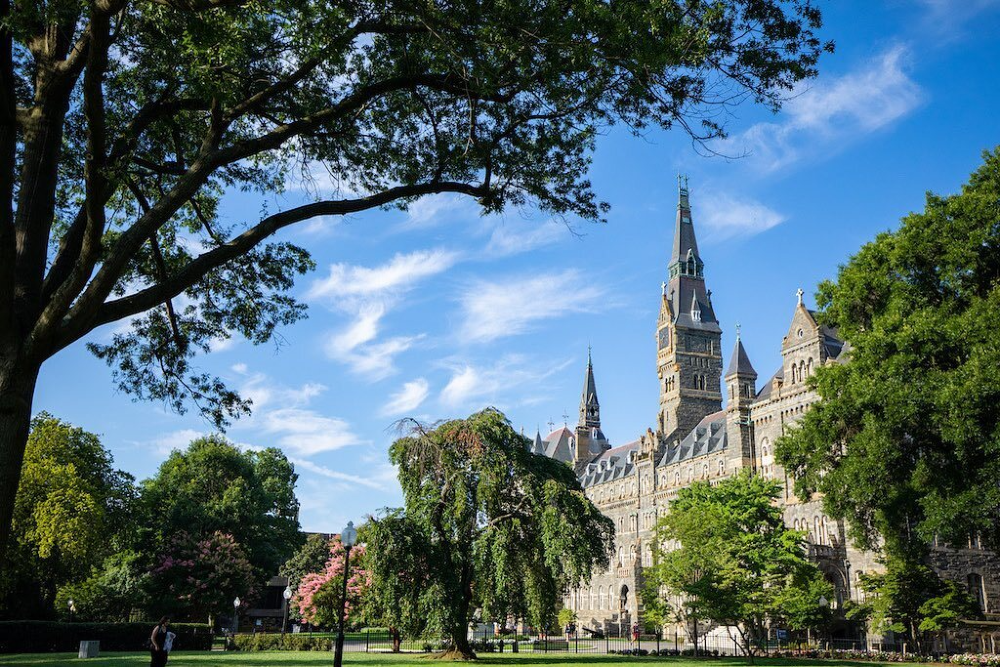CW: This article references violence in Afghanistan. Please refer to the end of the article for on- and off-campus resources.
Student government leaders have released a statement calling on Georgetown University to provide student visas for students affected by the Taliban takeover in Afghanistan.
The Aug. 21 statement, written by four members of the Georgetown University Student Association Senate, calls for the university to establish a grant that would fund student visas for Afghan students, allowing them to study safely at either the main campus or the Qatar campus. This push comes after the Afghan government fell to the Taliban on Aug. 15, following the withdrawal of U.S. troops from the country. Many Afghans attempting to leave the country have faced life-threatening violence and disaster, with an explosion at the Kabul Airport on Aug. 26 killing over 100 individuals.

The university must support Afghan students by both establishing a student visa grant and working with the federal government to arrange for accessible international student immigration, according to GUSA Senate Speaker and statement co-author Leo Rassieur (COL ’22).
“No doubt this would require advocacy vis-a-vis the federal government, but that kind of advocacy is not something that Georgetown should shy away from,” Rassieur wrote in an email to The Hoya. “We need to take a stand for this lifesaving policy and recognize that every dollar spent on such a grant would be worth it if it is able to save the life of someone in imminent danger.”
Georgetown has a duty to help students who have been affected by the ongoing humanitarian crisis, according to Zahra Wakilzada (COL ’23).
“I was born towards the end of the Taliban regime in Afghanistan and witnessed the impact of their regime for 12 years of my life in Afghanistan,” Wakilzada wrote in an email to The Hoya. “I hope the university acknowledges the impact that the situation in Afghanistan has and will continue to have on its Afghan students, especially those who have family in Afghanistan, and be more understanding and flexible in the upcoming semester to us as we mourn the loss of not our country but also some might mourn the loss of family members due to brutal ruling of the Taliban.”
The Taliban exercised control over Afghanistan from 1996 until the beginning of U.S. intervention in 2001 and imposed oppressive measures against the country’s population during their time in power, banning women from working and targeting those who opposed their rule.
The university has committed to helping Afghan students through the U.S.-Afghan Women’s Council, a program initially founded at Georgetown that aims to promote Afghan women and girls education, health care and economic opportunities, according to a university spokesperson.
“Since 2001, Georgetown has been at the forefront of efforts to support Afghan scholars and students and will continue our outreach and advocacy,” the university spokesperson wrote in an email to The Hoya. “In these incredibly difficult and chaotic times, the U.S.-Afghan Women’s Council remains steadfast in its commitment to the people of Afghanistan, especially the Afghan women and girls and has shared ways the community can help.”
The university spokesperson did not provide comment regarding the funding of visas for Afghan students.
The statement also encourages Georgetown community members to donate to local and international organizations that are providing aid to people in Afghanistan and Afghan refugees, such as the Lutheran Social Services of the National Capital Area, which aims to resettle 2,500 Afghans in six weeks.
Many community members have brought attention to the crisis in Afghanistan via social media, but more tangible work can be done to help Afghans directly, according to GUSA Senator Brett Guessford (COL ’23), who co-authored the statement.
“I’ve seen a lot of awareness raised on social media along with resources being shared around, but many of the challenges of relocating Afghans to safety are still ahead of us — that’s why we made sure to include volunteer and donation opportunities regarding local DMV area organizations,” Guessford wrote in an email to The Hoya.
Rassieur hopes that the statement will prompt the university administration and the Georgetown community to reach out to those affected by the crisis in Afghanistan.
“We have been encouraged by the solidarity many in the Georgetown community have shown to Afghans and others affected and endangered by the conflict, whether in Afghanistan, the U.S., or elsewhere,” Rassieur wrote. “That being said, we must do much more to inform the community about the humanitarian toll of the Taliban’s resurgence, and the University administration in particular must take practical steps to demonstrate solidarity with the Afghan community and all those impacted.”
Resources: On-campus resources include Health Education Services (202-687-8949) and Counseling and Psychiatric Service (202-687-7080); additional off-campus resources include the District of Columbia Office of Refugee Resettlement (202-698-4316).




















